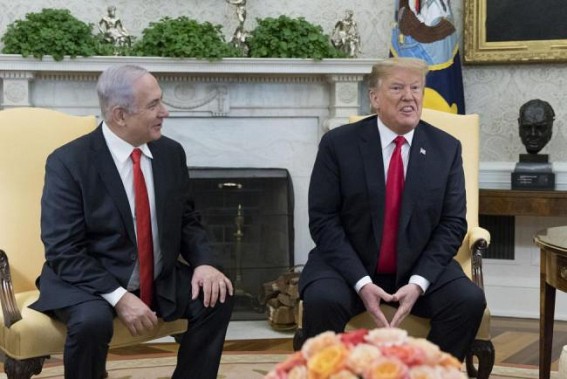TIWN

Tel Aviv, April 7 (IANS) Israel Prime Minister Benjamin Netanyahu said he would extend the country's sovereignty over parts of the West Bank if re-elected in the April 9 legislative polls, a major policy shift that would stir Arab opposition.
Just three days before Israelis vote on whether he should get a fifth term, Netanyahu said on Saturday that he was contemplating moves that would upend decades of the nation's policy acknowledging that the lands it seized in the 1967 war would be part of a negotiated settlement with the Palestinians, Efe news reported.
The Prime Minister's apparent push to cement control over the West Bank comes in the wake of victories in getting the US to acknowledge Jerusalem as the country's capital and its sovereignty over the Golan Heights seized from Syria in 1967 as Israeli territory.
In recent weeks, Netanyahu has become more strident in speaking about lands seized, saying territory taken in a defensive war need not be returned.
On Saturday, an Israeli Channel 12 interviewer asked Netanyahu why, with the broad consensus of Israel's right wing over the sovereignty for the settlements, he hadn't annexed or placed Israeli sovereignty over parts of the West Bank during four years of leading a right-wing government.
"We are on the way; we are in discussions about it and other things... Everyone understands the next term will be fateful," he said.
Netanyahu went further, contradicting previous American-led peace plans that would have allowed Israel to negotiate the annexation of large settlement blocs but not smaller isolated settlements that would break up the continuity of an eventual Palestinian state.
"I am going to apply Israeli sovereignty, but I don't distinguish between settlement blocs and isolated settlements."
Israeli sovereignty would ensure that Israeli civil law applies in its settlements there, while annexing them would claim the territory outright.
Netanyahu is trying to marshal his right-wing base, as his party, Likud, is in a tight race with a coalition led by his former army chief of staff, Benny Gantz, and trails him in most recent polls.
Right-wing parties are doing well enough that the prime minister could still be in position to form a government, but the election is expected to be close.
US President Donald Trump said on Saturday that there were "two good people" running in Israel's coming election and that the race would be tight.
Israel already controls the West Bank militarily, allowing Palestinians a limited form of autonomy in a few densely populated pockets. Applying Israeli sovereignty and civil law or annexing territory outright would be fiercely opposed by the nearly 3 million Palestinians who live in the West Bank as well as much of the Arab world.
Netanyahu previously had backed resolving settlements' fate in final status discussions, though in recent years has said he won't support the establishment of a Palestinian state. Israelis have grown accustomed to viewing Israeli settlements as part of their country. Polls show about half of Jewish Israelis no longer support a Palestinian state.
The Trump administration is expected to release its peace plan shortly after the Israeli elections, and little is known about it. The Trump administration's ambassador to Israel David Friedman said the President understands Israel's need to maintain security control over the West Bank.
The premier has made last minute election policy shifts before.
In 2015, he came out against a Palestinian state just days before the vote, when polls suggested that he was trailing Zionist Union's Isaac Herzog.
- Russia, after Western Palestinian state recognition move, says it still backs a two-state solution
- Over 800 dead, 1000 injured inEarthquake in Afganistan
- Confident that my visits to Japan and China would further national interests and priorities: PM Modi
- Awami League warns of alarming spike in violence against women, children in Bangladesh
- 12 Killed As Under-Construction Bridge Breaks Into Two In Northwest China



